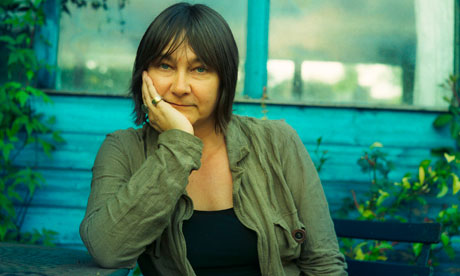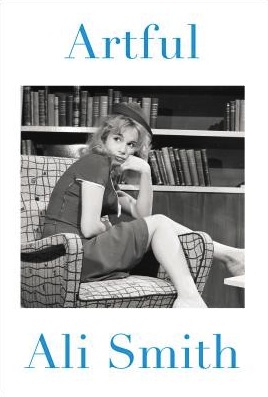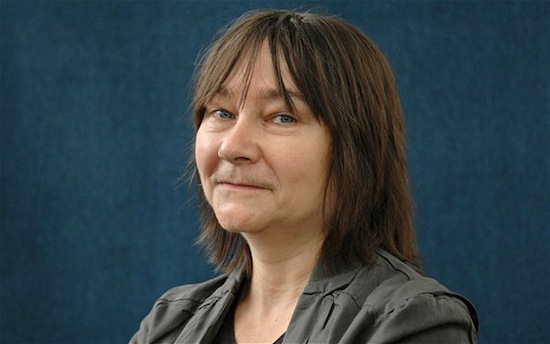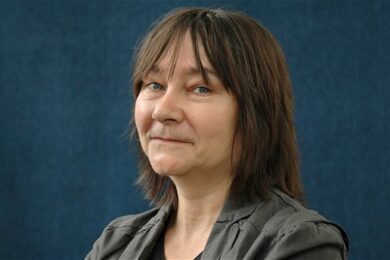Form, Ali Smith says, “will tell you everything about where [a people] live and what shape they’re in.” And Artful, the Inverness-born auhtor’s new book, is preoccupied with form – with the production of new forms, and with the transgression of their boundaries. The collection, much like form its self, can be defined via negativa – as much by what it is not as by what it is: it is a collection of lectures, but it is not pedagogic; it is the story of a dead lover, but it is not a work of fiction; it is literary criticism but it is never less than full-hearted.
“Artful had a brief,” Smith explains via email. “I had to write four lectures about comparative European literature and give them to an audience. I’m uneasy with the lecture form, and wanted to see what happened if the form loosened up, unpeeled itself, put its roots in fiction.” This process of loosening is perhaps the book’s signal quality, no one genre having a tight grip on its contents. Constructed around the fictional discovery of a dead lover’s manuscripts – notes for a series of lectures about comparative European literature, lectures which remain undelivered, the “author” having died before they were due to be given – the book slinks between narrative and criticism, one moment delighting in Mansfield or Hitchcock or Ovid, and the next showing us the unique pain of mourning. The constraints of form, of any form, are loose here, enabling Smith to shift between lecture and fiction easily – and, ultimately, combining the two.
Artful is dizzyingly original but it is not, of course, without influence or precursors: the book stems, Smith says, “from a meeting of Atwood’s sublime examination of voice in literature, Negotiating With The Dead, Calvino’s Six Memos [for the Next Millennium], and Woolf’s A Room Of One’s Own, where she makes authority a meld of fact, fiction, interruption, fluidity, imagination and change, to such an extent that she forces redefinition of the possible canon.” Of these surrogate parents, it is Calvino who seems to loom largest on the pages – parallels between Artful and Six Memos are frequent, some more explicit than others. Calvino’s lectures were also undelivered, the author – in this instance the real author – having died in 1985 shortly before they were due to be given. At one point Smith’s character even finds a section in the lecture notes dedicated to Calvino and tries to decipher the handwriting:
“The next page, which was the last page of On Form, had a scrawl on it, difficult to read. Did that say Italic? Italian? Cumin? Italian Cumin says near the end of his book Six Memos that letters of the alphabet, words, literatures, are combinations, ‘pages of signs, packed as closely together as groins of [must be grains of] sand, representing the many-colored spectacle of the world on a surface that is always the same and always different, like dunes [slitted?] by the desert wind.’”
Artful ought, in fact, to be read alongside both Six Memos and If on a winter’s night a traveller. All three are zealous explorations of the art of writing; love letters to literature and its process. Smith’s incessant telescoping, in which it is never quite clear whether primacy is to be given to the object of description or to the description itself (and, indeed, in which the description becomes an object of description in its own right), comes from the same fractured place as the celebrated Italian’s novel – a place of endless intersecting reflections opening out like mirrored origami. Smith, like Calvino, is fascinated by the continued possibilities presented by modernism. She is consistently bracketed as a modernist author, and yet has said that she does not consider her work to be modernist. “It’s just that I’m not comfortable with any bracket,” Smith says. “I don’t like the notion that writing is about fixity.” She quotes, with some irony, D.H. Lawrence: “Absolutely, we must have no absolutes.”
“But,” she says, “I have always loved the modernist writers, and held that modernism in literature is a time not just of wasteland fragments shored against ruin (on Margate sands I can connect nothing with nothing), but of the energy and renewal and surprise and attention to language at all levels that means that even if you put ‘nothing’ alongside ‘nothing’, something connective and potent (I can connect) will happen in the process – and I love the issue that modernist writing takes with form and structure and shape, from phrase all the way to questions of genre, and its democratising.”

Much of Artful is preoccupied with moments or occurrences that interrupt the flow of time or history, or that bring the passage of time into sharper relief. Clearly we are experiencing a period of this sort – an epochal change during which our conceptions of history and future are being comprehensively challenged and remade. Last year’s riots, those tentative insurrections that were in part about wresting narrative control away from capital, appear in Artful as an example of such an occurrence: “The riots – that moment of surfacing of such anger and articulation about a society splitting between haves and have nots – turn up in this book as a moment of deadened looping of image and sound on BBC 24, image and sound pretending to be happening in immediacy, but obviously a dead loop if you watch it for more than two minutes – a quick little critique of the way our mainstream media deals with and serves to us what is ‘really happening’.”
Artful is part of a clutch of new work that explores, with varying degrees of reverence and success, the essay form. Contemporary novelists seem to be rediscovering the power of lyrical non-fiction – consider, for example, London’s Overthrow, science fiction writer China Mieville’s excellent pseudo-dérive around a capital in the depths of austerity dysphoria. If form, as Smith claims, tells us about the shape we’re in then what does the resurgence of the essay say about us today? “It tells me that we love thinking deeply and in a stratified manner,” Smith says, “no matter how soundbitey our politics strives to be or our media tries to suggest thinking has become, and that perhaps in reaction to this, and to the virtual surface world of the computer screen, we will always want language to allow all the excavatory levels and layers of thinking and meaning.”
Artful is indeed an excavation – of a lover’s work, of a relationship mourned, of the changing face of fiction, and of its constant power. With these themes Smith has constructed a uniquely human monument to language, and a guidebook to a potential new literature. As we struggle to clarify the meaning of our extraordinary times, and as we work to build an art with which we can make sense of them, Smith is out front, showing us what is possible.
“We have to be alive,” Smith says, “to the deadening effect of the loop.”
(This interview was conducted via e-mail.)

Artful is available now on Hamish Hamilton
Follow @theQuietusBooks on Twitter for more



